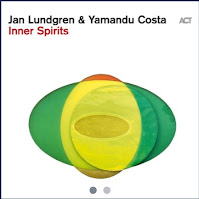Jan Lundgren (piano); Yamandu Costa (guitar)
Piano and guitar albums
are not that common in jazz, perhaps because both instruments seem to occupy
the same part of the musical spectrum. Alternatively, perhaps there should be
more of them, because they seem to occupy the same part of the musical spectrum
which means that, when you get an album like this it sounds like four hands
interweaving so closely together that there are so many ‘can’t tell when one
ends and the other starts’ moments, most of which are moments of joy.
Each of the pieces is a duet in the purest sense. Despite the writing credits being shared between the two players (Lundgren 4½ to Costa’s 5½, plus 4 covers) the lead player baton is passed between the two with dazzling frequency, lead and support roles are regularly claimed and surrendered and the quality of the interplay lies at the heart of all of its strengths. It’s two players with a high degree of empathy, supporting each other faultlessly and letting the space allowed by the absence of a band to work for them, shining a tightly focused light on the notes.
They cover a range of
styles from folk, suggestive of artists like Jim Croce and tunes like Danny Boy, to Latin (inevitably, given
Costa’s Brazilian origin, with covers of tunes by Antonio Carlos Jobim and Luiz
Bonfá) to Nocturne’s high stepping dance
to something that sounds like it should have been a Judy Garland film song (Diplomata) all following on from the
opening waltz, Para Aprender a Amar.
There are changes of pace with moments of scrappling guitar reminiscent of
Larry Coryell, to spells of mellow contemplation such as on Costa’s A Legrand where his guitar seems to ask
questions to understand Lundgren’s melancholic lead. At other times they simply
swap leads with each taking a line or two of the melody. This is not combative
but simply two good friends encouraging the other to play awhile with the tune. Dave Sayer

No comments :
Post a Comment